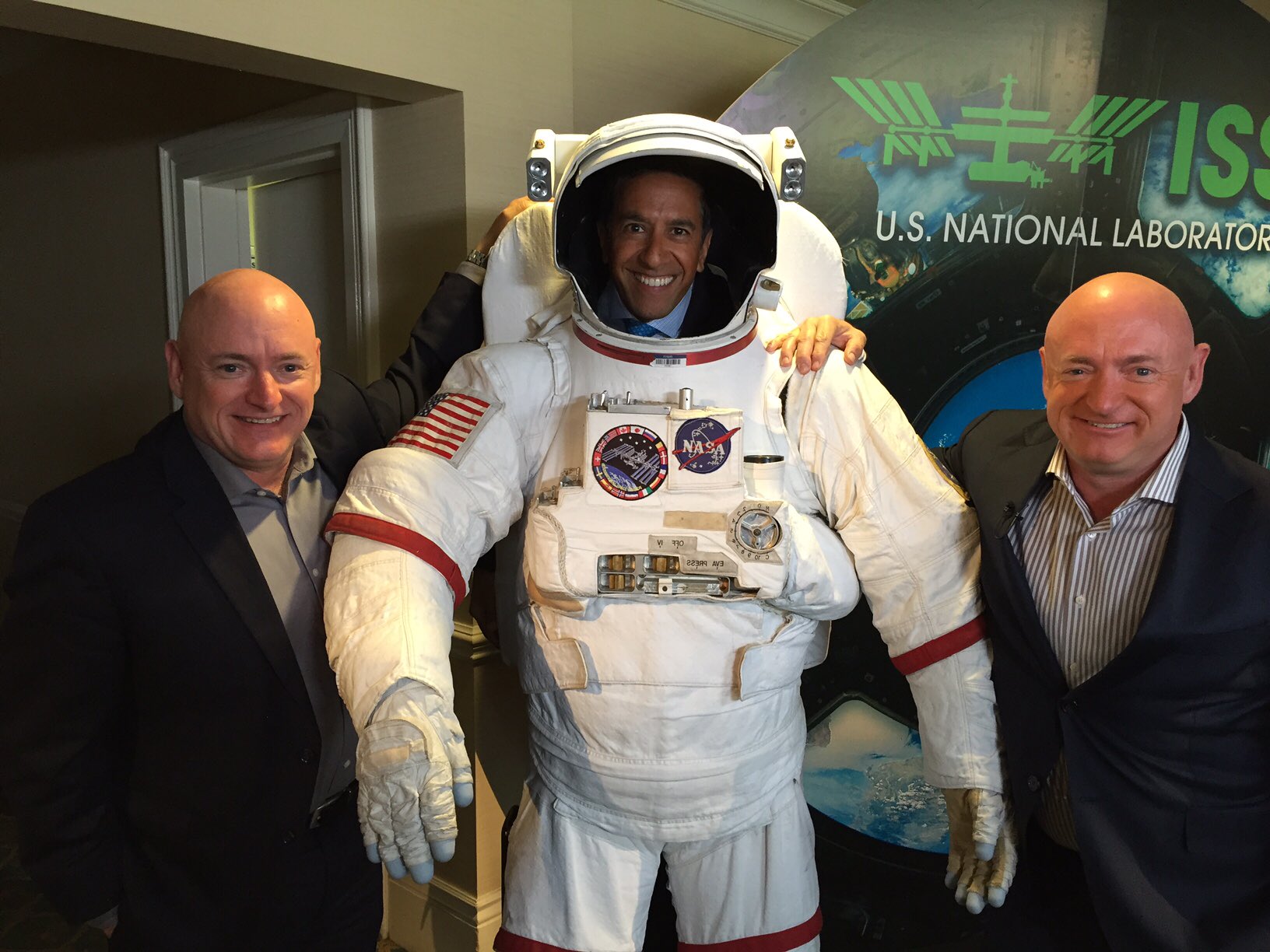
Former astronauts Scott and Mark Kelly pal around with CNN’s Sanjay Gupta at the International Space Station Research and Development 2016 conference in San Diego on July 12, 2016.
Credit: Scott Kelly via Twitter (@StationCDRKelly)
It really is all relative: Former NASA astronaut Scott Kelly’s historic one-year mission aboard the International Space Station (ISS) made his identical twin Mark an even older brother.
The unprecedented jaunt, which ended this past March , brought Scott Kelly’s total time in orbit to 520 days — all of which he spent zooming around Earth at 17,500 mph (28,160 km/h).
Albert Einstein’s theory of special relativity holds that time moves more slowly for objects in motion compared to a stationary observer, and experiments have borne out this prediction. This “time dilation” is most dramatic and noticeable at relativistic speeds, but the effects manifest even at the much lower velocities experienced by bodies in Earth orbit. [The Human Body in Space: 6 Weird Facts ]
“So, where[as] I used to be just 6 minutes older, now I am 6 minutes and 5 milliseconds older,” Mark Kelly said Tuesday (July 12) during a panel discussion at the ISS Research & Development 2016 conference in San Diego. Scott Kelly also participated in the panel, which was moderated by CNN TV personality Sanjay Gupta and webcast live. “Now I’ve got that over his head.”
Mark Kelly is also a former NASA astronaut; he logged a total of 54 days in orbit over the course of four space shuttle missions between 2001 and 2011. But Scott Kelly’s greater exposure to space radiation could end up aging him prematurely, Mark joked.
“So if 10 years from now, I look like I’m 60 and he looks like he’s 80, you’ll know what happened,” Mark said. (The brothers are 52.)
“Mark got Botoxed, is what happened,” Scott shot back, drawing a laugh from the audience.
During the discussion, Gupta asked the twins about their spaceflight experiences, especially the one-year mission, which Scott flew with cosmonaut Mikhail Kornienko.
Mark participated in that effort as well, albeit from the ground. The elder twin served as a sort of experimental control for comparison, offering up biological samples to researchers interested in determining how Scott’s long-duration space stay affected his genome, if at all.
Mark Kelly said he initially planned to provide these samples and perform the related tests for free, to help NASA and the mission.
“But a month later, they [NASA officials] come back and they say, ‘Oh, actually, it turns out we have to pay you,'” Mark Kelly said. “So I was all excited — how much am I going to get paid?”
But the going rate turned out to be minimum wage, he added.
“So, for the last year, while he [Scott Kelly] was in space, I was the lowest-paid federal government employee,” Mark Kelly said.
The main goal of the one-year ISS mission, and the associated “twins study ,” is to help lay the foundation for crewed journeys to Mars, which NASA hopes to pull off by the late 2030s. Determining how Scott Kelly and Kornienko fared psychologically and physiologically during their 340 days in orbit should help keep future Red Planet pioneers safer and healthier, NASA officials have said.
Scott Kelly said he feels pretty good at the moment, though he’s still not fully back in the swing of Earth life, which is much less structured and regimented than life aboard the orbiting lab.
“On my last flight [before the one-year mission], which was six months long, it seemed to take about six months for me to start to feel really back to normal in that regard,” Scott Kelly said. “I’m hoping that it’s not going to be a year [this time], and it’s not a one-to-one relationship.”
The major results of the “twins study” should be published next year, said Andrew Feinberg, a geneticist at Johns Hopkins University who also participated in Tuesday’s discussion, along with NASA flight surgeon Steve Gilmore.
Follow Mike Wall on Twitter @michaeldwall and Google+ . Follow us @Spacedotcom , Facebook or Google+ . Originally published on Space.com .
Comments are closed.